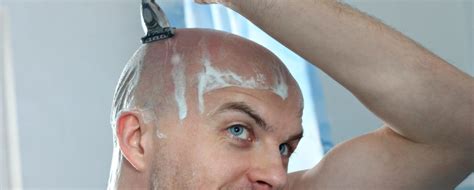Introduction

Balding, a prevalent concern affecting millions worldwide, has spurred countless myths and misconceptions. One persistent belief is that shaving the head can combat or even reverse hair loss. In this comprehensive article, we delve into the scientific evidence and expert opinions to uncover the truth behind this widespread theory.
Myth vs. Reality: Busting the Shaving Hair Myth
Despite its popularity, there is no scientific evidence to support the claim that shaving your hair fights balding. In fact, experts emphasize that shaving hair only affects the visible portion of strands, not the hair follicles beneath the scalp.
The Science Behind Hair Growth
Hair growth is a complex process regulated by genetics, hormones, and environmental factors. The hair follicle, a small organ in the skin, plays a pivotal role in hair production. When the follicle is healthy, it produces new hair strands. However, factors such as genetics, aging, and certain medical conditions can damage follicles, leading to hair loss.
Understanding Pattern Baldness (Androgenetic Alopecia)
Pattern baldness, the most common type of hair loss, is caused by a combination of genetic predisposition and androgenic hormones, particularly dihydrotestosterone (DHT). DHT binds to receptors in hair follicles, shrinking them and shortening the hair growth cycle, eventually resulting in balding.
Shaving Hair: No Impact on Follicles and DHT
Shaving the hair does not affect the hair follicles or DHT levels. The process merely removes the visible portion of hair strands, leaving the follicles and underlying mechanisms unaffected. Therefore, shaving cannot prevent or reverse the effects of androgenetic alopecia.
Other Factors Affecting Hair Loss
While shaving does not directly contribute to hair loss, other factors can influence shedding. Harsh hair treatments, excessive heat styling, and poor nutrition can weaken hair strands, making them more prone to breakage. Stress, medications, and certain medical conditions can also impact hair growth.
Alternative Treatments for Hair Loss
If you are concerned about hair loss, consult a healthcare professional for proper diagnosis and treatment options. Effective treatments include:
- Medications (e.g., minoxidil, finasteride)
- Hair transplants
- Laser therapy
- Scalp micropigmentation
Conclusion
The myth that shaving hair fights balding is unfounded. Shaving only affects the visible portion of hair strands and has no impact on the hair follicles or underlying mechanisms that contribute to balding. If you are concerned about hair loss, seek professional advice to explore effective treatment options and address the underlying causes. Remember, embracing your balding experience can be empowering, promoting self-acceptance and confidence.
